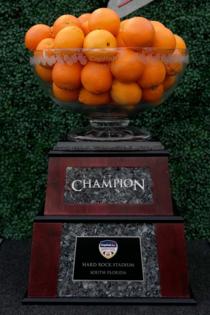Between CFP championship, Orange Bowl, Dolphins and Hurricanes -- Hard Rock Stadium will be hopping
Published in Football
If the college football season plays out in just the right way, Hard Rock Stadium could wind up hosting three College Football Playoff games in a span of just a few weeks.
The Hurricanes would have to perform well enough to earn a spot in the playoffs and have a high enough seed to host a first-round game. Then Hard Rock Stadium will host the yearly Orange Bowl — a College Football Playoff quarterfinal game this season. Finally, on Jan. 19, Hard Rock Stadium will be the venue for this year’s national title game.
“We’re just fortunate, going back to what South Florida has to offer, from the hotels to the convention center to the event venues and then, most importantly, Hard Rock Stadium is just a state-of-the-art facility,” Orange Bowl Committee CEO Eric Poms told the South Florida Sun Sentinel. “Thanks to (Dolphins owner) Steve Ross and (Dolphins CEO) Tom Garfinkel, it’s evolved into just an entertainment destination.”
If Hard Rock Stadium does host three playoff games — in addition to two late December Dolphins home games — Poms said everyone involved is prepared.
“We’re very fortunate to have stadium management that’s second-to-none,” Poms said. “They’re pros at this, and we’ve been planning for years. And all these contingencies have been discussed, and they’ll continue to be discussed until January.”
Hard Rock Stadium is hosting the national title game for the first time since 2021, which provided different challenges due to the COVID-19 pandemic. That year, Alabama beat Ohio State in front of a limited crowd of only 14,926 people. This season, a full crowd is likely.
“We didn’t know they were going to play college football, let alone get through the regular season, and for that matter, to get through the postseason,” Poms said. “And in the end, and it was remarkable that Miami and South Florida were able to successfully work with the College Football Playoff to pull off that game. But we were excited about having the next opportunity to do it once again.”
The Orange Bowl, which hosted the semifinal between Notre Dame and Penn State last season, is one of six bowl games that rotates hosting semifinals and quarterfinal games in the 12-team College Football Playoff. This year, it is hosting a quarterfinal.
“That’s a big undertaking in itself,” Poms said. “When you combine that with being the lead entity in the host-committee effort for the championship game, and then all the community outreach elements that comes with it, it’s a lot of volume that’s taken place down here. But that’s what we do. Nobody owns the Orange Bowl Committee. Nobody owns the host committee. It’s the community that’s doing it. Everybody owns it, and so we’re stewards of that.”
Bowl games have taken a hit to their prestige for years as players choose to opt out of non-playoff games and some people treat them as glorified exhibition games. But the Orange Bowl’s place among the playoff games can help ensure its continued tradition. This season’s game will be the 92nd Orange Bowl.
“First and foremost, change is just reality in any industry. So I think all the stakeholders in college football have to embrace change,” Poms said. “With that being said, no, we’re proud. And I know the Rose, the Sugar, the Cotton, Fiesta, Peach — we’re proud of these historic traditions that we represent. They represent some of the great cities in America and some of the great events. And we date back close to a century. And so it’s really something that I think should be protected, and is (an) essential part of the College Football Playoff. I think that with that being said, we have to be mindful that it’s now a four-round playoff, and the way we position ourselves into that ecosystem has to connect with the leadership of college football, the commissioners, the athletic directors, and what their vision is.”
Poms said the Orange Bowl Committee’s community actions are continuing to grow. They are developing two more legacy parks, bringing the total to eight across South Florida, and they are working with the College Football Playoff Foundation for the Extra Yard for Teachers program, which is renovating elementary and middle school libraries.
“At the end of the day, just speaking for the Orange Bowl committee, we were founded in 1935 and our mission statement was about economic development, and by virtue of the success of the bowl game, is to give back to the community,” Poms said. “We’re so proud that 92 years later, that mission statement’s never changed, no matter what’s evolved in postseason college football. For close to a century, we’ve stayed the course on bringing tourism to the area and giving back to the community. And so you look at where we’re at right now, it’s more prominent than ever.
©2025 South Florida Sun-Sentinel. Visit sun-sentinel.com. Distributed by Tribune Content Agency, LLC.







Comments